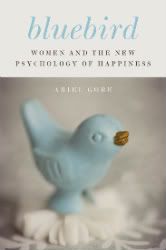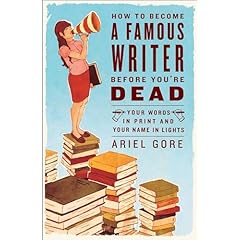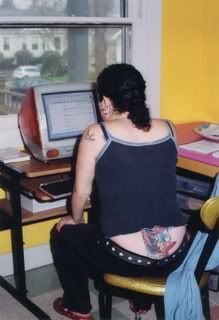Thinking About Bonnie Tinker
May 26, 1948- July 2, 2009
By Lisa Sinnett
There’s a kaleidoscope in the conservatory where I’ve stopped with my daughters. There’s a circular bed of sand with sticks and rocks, and above, the lenses and mirrors. We shift the sand around and look, and each time the picture is different. If you look deep inside a kaleidoscope, what you see is the ocean of patterns of light, surrounded by a rim of darkness, curving away like night falling.
Trying to write about Bonnie Tinker is kind of like this. The ways in which Bonnie touched people’s lives are complex, shifting and beautiful.
I first met Bonnie the Friends for Lesbian, Gay, Bisexual, Transgender and Queer Concerns talent show fundraiser at our Quaker Conference. She was standing on her head in between acts to raise money—we connected somewhere in between a twenty-dollar bill and a bright pair of socks.
I didn’t know she’d had such a far-reaching effect on the world back then—At the conference, I came to know her as an amazing workshop-leading, music-loving, peace-activist luminary, and I needed what Bonnie and others in this fellowship believed at their very core: “We are learning that radical inclusion and radical love bring further light… Our experience with oppression in our own lives leads us to seek ways to bring our witness to bear in the struggles of other oppressed peoples.”
As I learned about her life, I would understand her beliefs more deeply As the roots that nourished her work as the Executive Director of Love Makes A Family, Inc.—the racially diverse group of sexual minorities and their allies in Oregon and Southwest Washington that came together to oppose anti-gay ballot measures in Oregon, and to accompany others who are doing the same kind of activism across our country.
With her wife, Sara Graham, Bonnie raised three kids—Alex, Josh, and Connie. A member of Multnomah Friends Meeting in Portland, Oregon, and of Seriously P.O.’d Grannies, she developed the LARA method for non-violent conflict resolution based on Gandhi’s principles. The Founder and Executive Director of Love Makes A Family, Inc., she also founded the oldest domestic violence shelter on the West Coast--Portland's Bradley Angle House, which is still in operation. Her family was the victor in a well-known Supreme Court case that set the precedent for free speech in schools—Tinker vs. Des Moines School District ruled students could protest war in school.
Love Makes a Family “seeks to provide a public voice for all families, especially for those subjected to social, economic and legal discrimination due to sexual orientation or gender identity/expression.”
Feeling this acceptance through Bonnie’s presence and work helped me to set down a mask that I had been forced to wear my whole life without knowing why. My mother knew that she was gay when she was a high school student in her rural Michigan school, but growing up, we never knew.
She told me: “I was married in 1959. We were told to be loyal to God and country.” The thought of acting on her feelings with her girlfriends? “Dangerous.” I asked her about this, but she became silent. “There was a girl. Two girls. People suspected them of being gay.” She was silent for a long time. “I thought one of them committed suicide.”
That was the secret about our family—and it was like we were in the Witness Protection Program. Everything felt tentative, like we were playacting for a program about a family instead of being a family, but not knowing what we were upholding or why. We had activity, but no intimacy. How can there be intimacy when one person in the family has had to sacrifice her identity in order to survive? Everyone was deeply affected by this. We had the burden of being her unwitting jailers—yet we were her protectors, too. And we didn’t know any of it until mom came out to us when she was in her fifties.
I am thankful to Bonnie Tinker and to all the other activists who are opening spaces for families, and liberating people like my mother, who I am finally getting to know.
Many people have written or spoken about Bonnie and her wife Sara Graham’s journey facing discrimination and obstacles during their decades together. Bonnie worked for full inclusion for same sex unions, not only domestic partnerships. In Bonnie’s own words. “The M word matters. It confers social standing. It confers social acceptance. Marriage confers legitimacy. Our children will be declared legitimate. Marriage is about families taking our place in society with full respect.”
But there is still work to be done.
If you ever met Bonnie in person, you would see how much she sought to understand other people’s perspectives, and promote the common ground that we share. If you could hear her calling on the Spirit of Tinkerbell to impeach George Bush, or if you could see her getting arrested with the Seriously Pissed Off Grannies, you’d know what a surprising, memorable, and creative human being she was.
She was killed in early July in Virginia, where she was attending a Quaker conference, when a Mack truck turned in front of the bicycle she was riding and ran her over.
I think of Bonnie’s way of being in the world now and I remember something that her younger brother Paul said once. He said, “I want to have eyes like bees, and see the world from all the different facets.” Bees see the world complete, one perspective at a time. Bees see colors we don’t see. They see sunbursts of blue and red where we see only white.
Thank you, Bonnie, for helping us to open our eyes and see the world a little bigger. We’ll miss you.
With Love,
Lisa Anne Sinnett
Detroit, Michigan
Check out Love Makes a Family of Oregon
Bonnie Tinker: Clap if You Believe
By Lisa Sinnett
There’s a kaleidoscope in the conservatory where I’ve stopped with my daughters. There’s a circular bed of sand with sticks and rocks, and above, the lenses and mirrors. We shift the sand around and look, and each time the picture is different. If you look deep inside a kaleidoscope, what you see is the ocean of patterns of light, surrounded by a rim of darkness, curving away like night falling.
Trying to write about Bonnie Tinker is kind of like this. The ways in which Bonnie touched people’s lives are complex, shifting and beautiful.
I first met Bonnie the Friends for Lesbian, Gay, Bisexual, Transgender and Queer Concerns talent show fundraiser at our Quaker Conference. She was standing on her head in between acts to raise money—we connected somewhere in between a twenty-dollar bill and a bright pair of socks.
I didn’t know she’d had such a far-reaching effect on the world back then—At the conference, I came to know her as an amazing workshop-leading, music-loving, peace-activist luminary, and I needed what Bonnie and others in this fellowship believed at their very core: “We are learning that radical inclusion and radical love bring further light… Our experience with oppression in our own lives leads us to seek ways to bring our witness to bear in the struggles of other oppressed peoples.”
As I learned about her life, I would understand her beliefs more deeply As the roots that nourished her work as the Executive Director of Love Makes A Family, Inc.—the racially diverse group of sexual minorities and their allies in Oregon and Southwest Washington that came together to oppose anti-gay ballot measures in Oregon, and to accompany others who are doing the same kind of activism across our country.
With her wife, Sara Graham, Bonnie raised three kids—Alex, Josh, and Connie. A member of Multnomah Friends Meeting in Portland, Oregon, and of Seriously P.O.’d Grannies, she developed the LARA method for non-violent conflict resolution based on Gandhi’s principles. The Founder and Executive Director of Love Makes A Family, Inc., she also founded the oldest domestic violence shelter on the West Coast--Portland's Bradley Angle House, which is still in operation. Her family was the victor in a well-known Supreme Court case that set the precedent for free speech in schools—Tinker vs. Des Moines School District ruled students could protest war in school.
Love Makes a Family “seeks to provide a public voice for all families, especially for those subjected to social, economic and legal discrimination due to sexual orientation or gender identity/expression.”
Feeling this acceptance through Bonnie’s presence and work helped me to set down a mask that I had been forced to wear my whole life without knowing why. My mother knew that she was gay when she was a high school student in her rural Michigan school, but growing up, we never knew.
She told me: “I was married in 1959. We were told to be loyal to God and country.” The thought of acting on her feelings with her girlfriends? “Dangerous.” I asked her about this, but she became silent. “There was a girl. Two girls. People suspected them of being gay.” She was silent for a long time. “I thought one of them committed suicide.”
That was the secret about our family—and it was like we were in the Witness Protection Program. Everything felt tentative, like we were playacting for a program about a family instead of being a family, but not knowing what we were upholding or why. We had activity, but no intimacy. How can there be intimacy when one person in the family has had to sacrifice her identity in order to survive? Everyone was deeply affected by this. We had the burden of being her unwitting jailers—yet we were her protectors, too. And we didn’t know any of it until mom came out to us when she was in her fifties.
I am thankful to Bonnie Tinker and to all the other activists who are opening spaces for families, and liberating people like my mother, who I am finally getting to know.
Many people have written or spoken about Bonnie and her wife Sara Graham’s journey facing discrimination and obstacles during their decades together. Bonnie worked for full inclusion for same sex unions, not only domestic partnerships. In Bonnie’s own words. “The M word matters. It confers social standing. It confers social acceptance. Marriage confers legitimacy. Our children will be declared legitimate. Marriage is about families taking our place in society with full respect.”
But there is still work to be done.
If you ever met Bonnie in person, you would see how much she sought to understand other people’s perspectives, and promote the common ground that we share. If you could hear her calling on the Spirit of Tinkerbell to impeach George Bush, or if you could see her getting arrested with the Seriously Pissed Off Grannies, you’d know what a surprising, memorable, and creative human being she was.
She was killed in early July in Virginia, where she was attending a Quaker conference, when a Mack truck turned in front of the bicycle she was riding and ran her over.
I think of Bonnie’s way of being in the world now and I remember something that her younger brother Paul said once. He said, “I want to have eyes like bees, and see the world from all the different facets.” Bees see the world complete, one perspective at a time. Bees see colors we don’t see. They see sunbursts of blue and red where we see only white.
Thank you, Bonnie, for helping us to open our eyes and see the world a little bigger. We’ll miss you.
With Love,
Lisa Anne Sinnett
Detroit, Michigan
Check out Love Makes a Family of Oregon
Bonnie Tinker: Clap if You Believe





5 Comments:
Thank you so much for this, Lisa.
In peace,
Blessed be,
Stasa
Thank you for this moving testimony. I worked with Bonnie at Love Makes A Family since its inception. It is difficult for me to believe that she is gone. However, many of us are empowered and committed to fulfilling Bonnie's vision of a just society. The work continues and the dream is still alive.
Grace and peace,
Cecil
Thank you for this moving testimony. I worked with Bonnie at Love Makes A Family since its inception. It is difficult for me to believe that she is gone. However, many of us are empowered and committed to fulfilling Bonnie's vision of a just society. The work continues and the dream is still alive.
Grace and peace,
Cecil
I never met her (and she died not too long before Bonnie) but Bonnie's mother founded my Quaker Meeting here in Corpus.
lisa, this is beautiful. thank you. mai'a
Post a Comment
<< Home